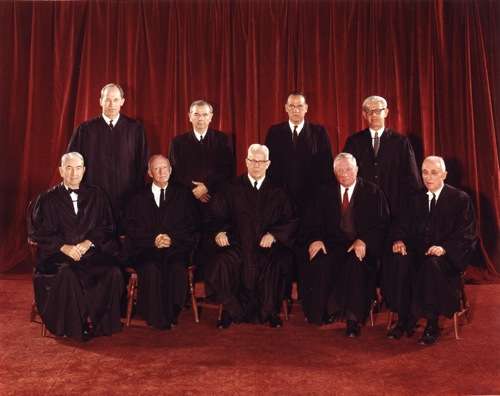The Volokh Conspiracy
Mostly law professors | Sometimes contrarian | Often libertarian | Always independent
Today in Supreme Court History: April 3, 1962
4/3/1962: Engel v. Vitale argued.

Editor's Note: We invite comments and request that they be civil and on-topic. We do not moderate or assume any responsibility for comments, which are owned by the readers who post them. Comments do not represent the views of Reason.com or Reason Foundation. We reserve the right to delete any comment for any reason at any time. Comments may only be edited within 5 minutes of posting. Report abuses.
Please to post comments


Smith v. Allwright, 321 U.S. 649 (decided April 3, 1944): political party (here, Texas Democratic Party) is a “state actor” and liable under the Fifteenth Amendment and §1983 (actually its predecessor statute) for refusing to let black man vote in primary election
United States v. “Old Settlers”, 148 U.S. 427 (decided April 3, 1893): 1889 Act of Congress revived Cherokee claim under 1846 Treaty for reimbursement for taking their land; Court affirms calculation of amount
Holloway v. Arkansas, 435 U.S. 475 (decided April 3, 1978): trial judge improperly refused request by attorney for three rape defendants for separate counsel due to conflict of interest between defendants; convictions vacated
Stanley v. Illinois, 405 U.S. 645 (decided April 3, 1972): unwed father of three children entitled to hearing as to his suitability as a parent after mother died; statute automatically making children wards of the state violated Equal Protection
Chapman v. United States, 365 U.S. 610 (decided April 3, 1961): consent of owner (who smelled mash) in tenant’s absence was not sufficient for warrantless search for illegal still (police found 1300 gallons of mash)
Oklahoma Tax Comm’n v. Jefferson Lines, Inc., 514 U.S. 175 (decided April 3, 1995): state sales tax on bus ticket to out of state did not violate Dormant Commerce Clause
Darr v. Burford, 339 U.S. 200 (decided April 3, 1950): must exhaust state court remedies before applying for habeas corpus (overruled by Fay v. Noia, 1963, which itself was overruled by Wainwright v. Sykes, 1977)
Collector v. Day, 78 U.S. 113 (decided April 3, 1871): federal government can’t tax income of state officials (here, a state judge) (overruled by Graves v. New York, 1939; state can tax federal official)
Vilas v. City of Manila, 220 U.S. 345 (decided April 3, 1911): City of Manila (Philippines was an American territory then) is liable for debts incurred during Spanish colonial era
City of Dallas v. Stanglin, 490 U.S. 19 (decided April 3, 1989): “teen disco” (limited to kids ages 14 - 18) did not violate teenagers’ right to associate (what? you mean I can’t bring in my 37-year-old boyfriend to meet my best buds??)
Darr v. Burford, 339 U.S. 200 (decided April 3, 1950): must exhaust state court remedies before applying for habeas corpus (overruled by Fay v. Noia, 1963, which itself was overruled by Wainwright v. Sykes, 1977)
The coin came up heads, then tails, then heads again.
Re: City of Dallas v. Stanglin
The city of Dallas, Texas passed an ordinance regulating the ages of admitted patrons and the hours of operation for dance halls.
The Court held that the ordinance was intended to protect the youth of Dallas against corrupting activity, which they may have access to when intermingling with adults. Therefore, the age restrictions on youth activities were reasonable under the First and Fourteenth Amendment rights to freedom of association and equal protection under the law considering they are enforced to protect the youth from corrupt activities. (oyez)
I (sorta) agree with the city here but the reasoning - to protect the youth of Dallas against corrupting activity, which they may have access to when intermingling with adults - is all kinds of messed up.
I assuming there was no prohibition against youth and adults co-mingling in a supermarket, Walmart, a playground, or any other public area, so am not sure why "dance halls" needed to be especially identified.
Target rich environment for drug pushers?
The ordinance was challenged by the owner of a hall separated by pylons into a dance floor (teens) and a skating rink (all ages) all moving and shaking to the same music. Any Equal Protection violation would only affect this strange (and I assume unique) kind of setup. Otherwise I don’t see any problem with this kind of ordinance (probably meant to deter “grooming” by predators). When my daughter was 14 or so I'd drop her and her friends off at one of those "teen discos" and it was one of those rare situations where girls that age were having a great time and their parents felt good about it.
First you get the Dancin', then you get the Marriage-a-Juan-A, and the Herrin, then the Forn-i-catin'!
Frank "Lets Dance!"
"so am not sure why “dance halls” needed to be especially identified"
Lot of sex [or its prelims]occurring at supermarkets, Walmart, playgrounds, and any other public area?
Dancing leads to sex. Didn't you see Footloose?
Why don't Baptists have sex standing up?
Ask a Baptist.
Answer:
Because it might lead to dancing.
I heard it "because some folks might think they are dancing."
That’s just as good
In 1950, dancing in public was still controversial in its own right. Many Protestant groups such as the Baptist Churches opposed it for religious reasons. This was before they decided God was mistaken. Laws restricting public dancing were not uncommon, especially for minors, although it was more common to regulate the hosts (a "good character" requirement was voided by SCOTUS but more specific laws survived for some time).
A case for judicial deference if I ever saw one.
“One fine night they leave the pool hall,
Headed for the dance at the armory.
Scarlet men and libertine women,
And ragtime! – shameless music that’ll grab your sons, your daughters,
Into the arms of the jungle.”
I guess that’s what they’re worried about.